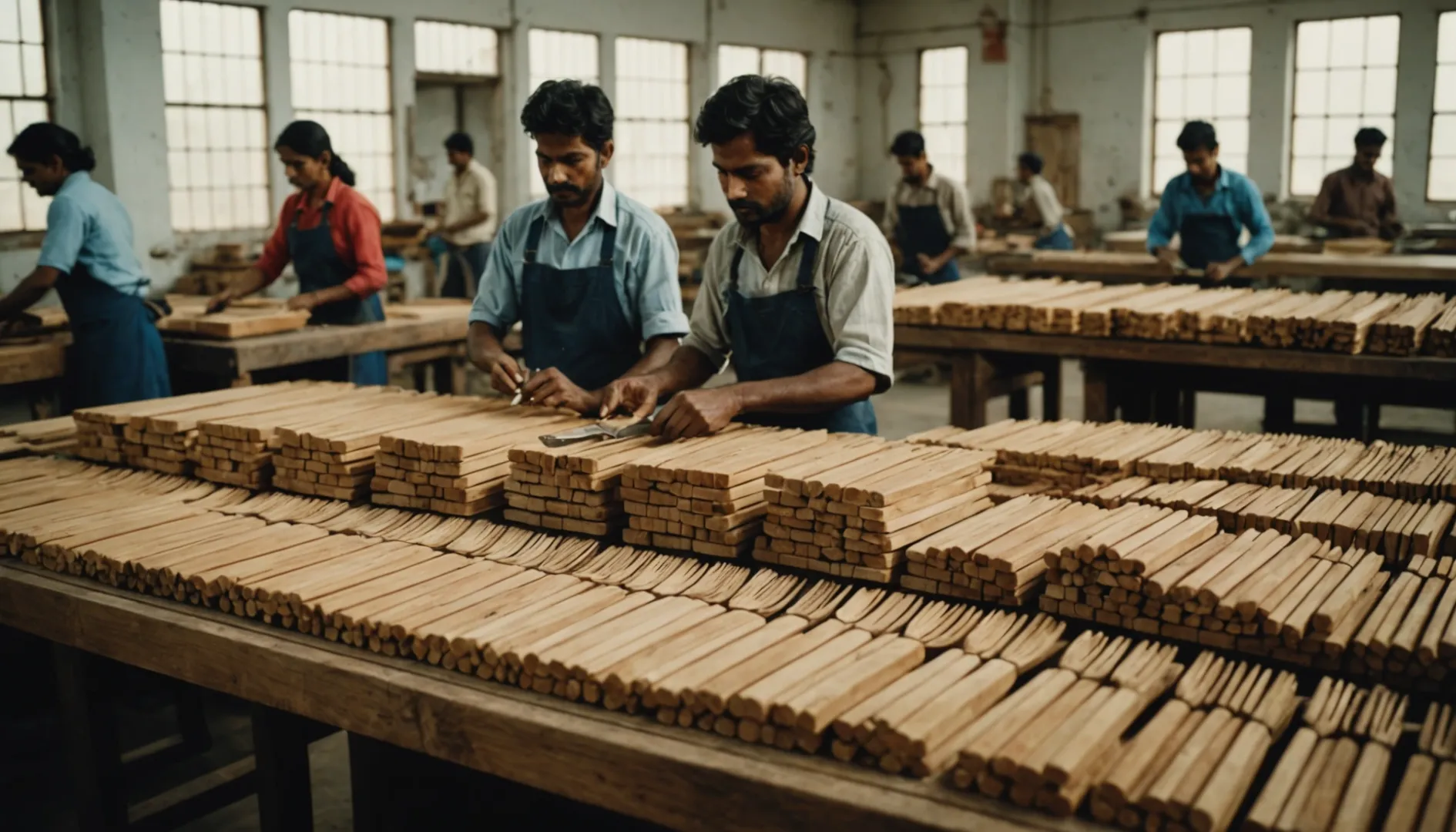
Have you ever considered how your dining choices impact our planet?
In an era increasingly focused on sustainability, the demand for eco-friendly dining solutions like disposable wooden cutlery is soaring. India, a hub for wooden utensil manufacturing, offers a diverse landscape of companies striving to meet this need.
While knowing the top manufacturers is a great start, understanding what sets them apart is crucial. Let’s dive deeper into their unique approaches to sustainability, product quality, and market influence.
Bambu India uses compostable coatings for cutlery.True
Bambu India employs compostable coatings to enhance biodegradability.
What Makes These Manufacturers Stand Out in Sustainability?
In the realm of eco-friendly dining, certain manufacturers excel in sustainability through innovative practices and ethical sourcing.
Manufacturers like Bambu India, Green Choice, and EcoWare excel in sustainability by using responsibly sourced materials, innovative biodegradable coatings, and transparent supply chains. They integrate eco-certifications, uphold high production standards, and focus on waste reduction and resource efficiency.
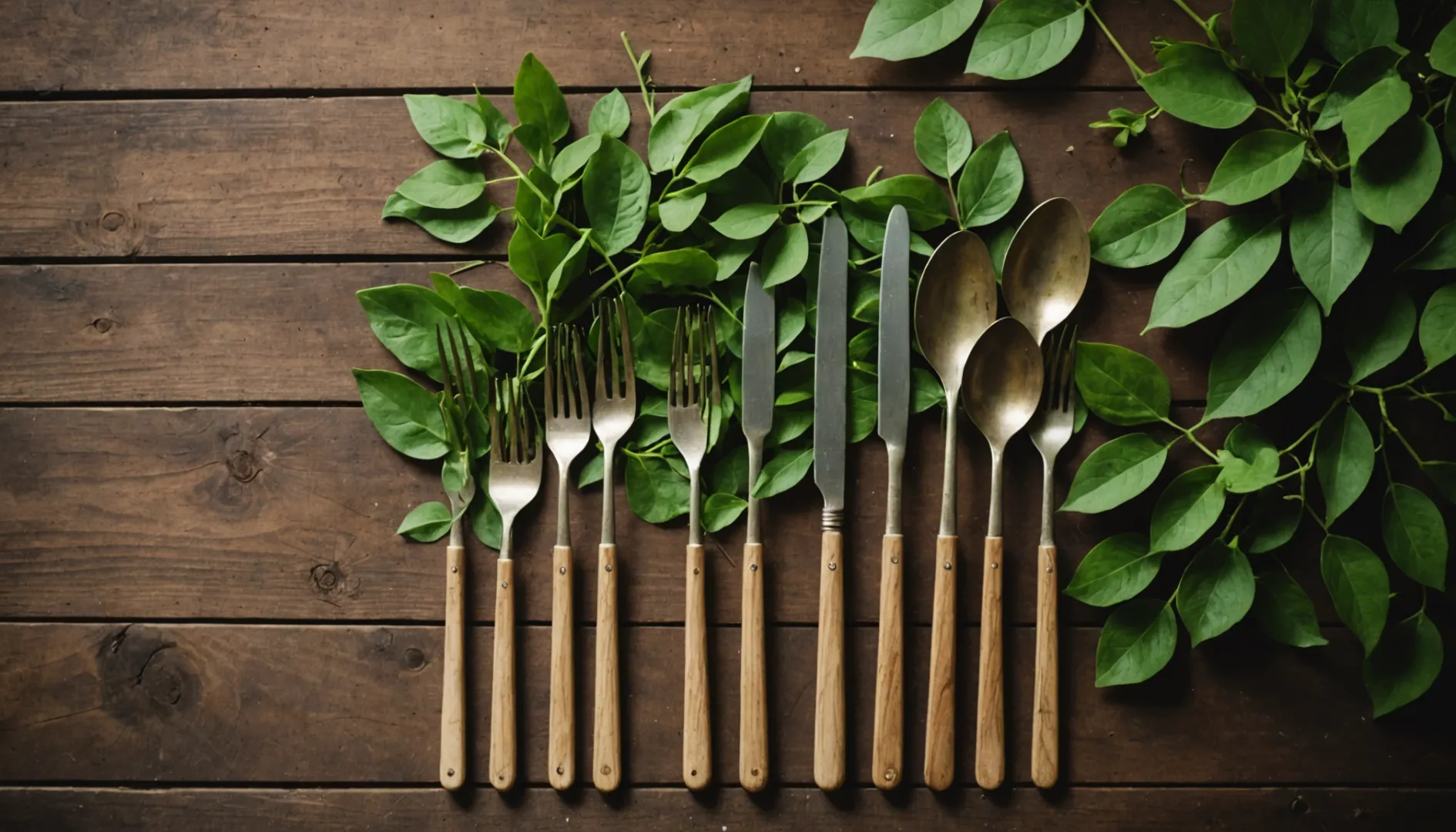
Commitment to Responsible Sourcing
Leading manufacturers of disposable wooden cutlery, such as Bambu India and Green Choice, prioritize responsible sourcing by obtaining materials from certified, sustainably managed forests. This practice not only ensures minimal environmental impact but also promotes biodiversity.
Eco-certifications like FSC (Forest Stewardship Council) validate their commitment to environmental responsibility. By aligning with these standards, manufacturers provide assurance to consumers about the ethical origins of their products, enhancing brand credibility in eco-conscious markets.
Innovative Eco-Friendly Practices
Innovation plays a crucial role in the sustainability efforts of these manufacturers. Companies are exploring compostable coatings1 that enhance biodegradability, allowing products to break down swiftly without leaving harmful residues. This is part of a broader strategy to create products that are not only environmentally friendly but also practical for consumers who seek minimal waste solutions.
Some manufacturers are experimenting with material blends, like bamboo fiber mixed with wood, to create utensils that are both lightweight and strong. This approach reduces material usage without sacrificing durability, showcasing a commitment to resource efficiency.
Transparency and Traceability
In response to growing consumer demand for transparency, manufacturers like EcoWare are adopting technologies such as blockchain to trace the origins of their wood. This technological integration offers a verifiable, immutable record of sourcing practices, ensuring that materials are harvested legally and sustainably.
Such transparency not only builds trust with consumers but also aligns with regulatory standards in markets that prioritize environmental protection. The ability to demonstrate responsible sourcing practices through traceability can significantly enhance a brand's market position.
Comprehensive Waste Reduction Strategies
Sustainability extends beyond production to encompass end-of-life product management. Leading manufacturers implement comprehensive waste reduction strategies by designing products for short-term reuse2. This approach allows consumers to use disposable cutlery multiple times before disposal, reducing overall waste generation.
Moreover, these companies focus on minimalistic designs that use less wood while maintaining product strength. This not only reduces material costs but also minimizes environmental impact—a critical consideration as global regulations on single-use plastics become more stringent.
Bambu India uses compostable coatings.True
Bambu India enhances biodegradability with innovative compostable coatings.
EcoWare doesn't use blockchain for traceability.False
EcoWare uses blockchain to trace wood origins, ensuring transparency.
How Do Indian Manufacturers Ensure Quality and Safety?
India's disposable wooden cutlery manufacturers prioritize quality and safety by implementing rigorous standards and sustainable practices, ensuring their products meet global expectations.
Indian manufacturers ensure quality and safety in disposable wooden cutlery through advanced production techniques, sustainable sourcing, and adherence to international certifications. These measures guarantee that the cutlery is not only eco-friendly but also safe for consumer use.
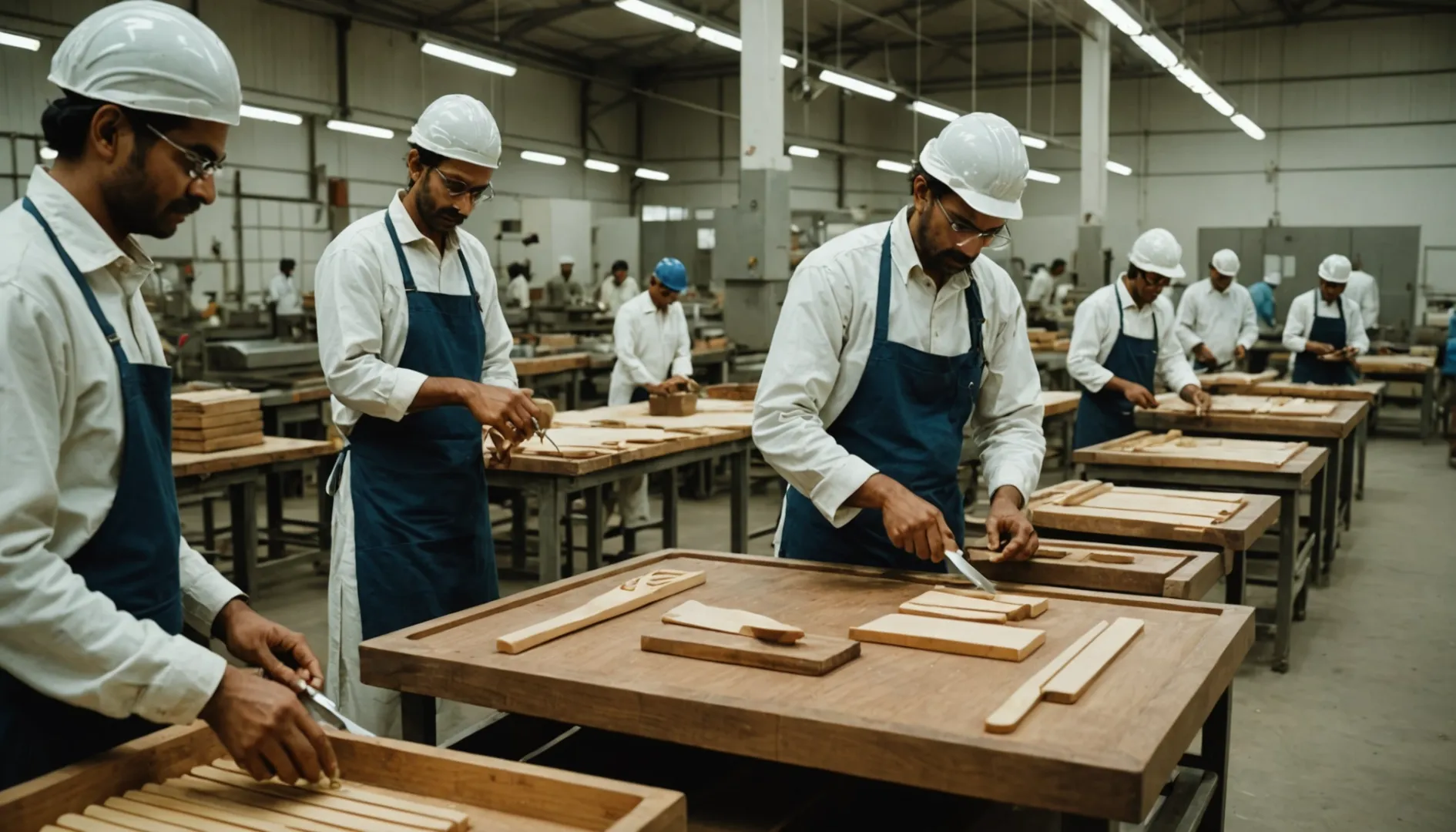
Advanced Production Techniques
Manufacturers in India utilize advanced machinery and precise engineering processes to produce high-quality wooden cutlery. This includes using CNC machines for accurate cutting and shaping, ensuring each piece is uniform and free from defects such as splinters or rough edges. By maintaining high production standards, they minimize the risk of contamination and enhance product durability.
For example, Bambu India has invested in modern production facilities that incorporate laser cutting technology to achieve smooth edges, reducing the risk of injury during use. This approach ensures that their products are not only aesthetically pleasing but also safe for consumers.
Sustainable Sourcing
Quality begins with responsible sourcing of raw materials. Indian manufacturers prioritize the use of sustainably harvested wood, often certified by organizations like the Forest Stewardship Council3. This not only supports environmental conservation but also enhances the quality of the final product by using high-grade wood that is less prone to warping or cracking.
Green Choice is a notable example, sourcing wood from FSC-certified forests, which guarantees that their products contribute to forest preservation while maintaining quality standards.
International Certifications
To ensure compliance with global safety standards, many manufacturers obtain certifications such as FDA (Food and Drug Administration) and LFGB (Lebensmittel- und Futtermittelgesetzbuch). These certifications assure consumers that the cutlery is safe for food contact and free from harmful substances. Obtaining such credentials requires rigorous testing and adherence to stringent quality controls.
EcoWare, for instance, has achieved both FDA and LFGB certifications, highlighting their commitment to providing safe, non-toxic cutlery suitable for international markets.
Emphasis on Hygiene Practices
Understanding that wooden cutlery's porous nature poses hygiene challenges, manufacturers employ treatments like natural oil or wax coatings. These coatings create a barrier against moisture absorption, significantly reducing bacterial growth risks. However, it is crucial that these treatments remain food-safe and do not degrade easily.
Some companies are exploring innovations in coating materials to enhance biodegradability without compromising hygiene. For instance, there is ongoing research into compostable coatings4 that could further improve product safety while maintaining environmental benefits.
By focusing on these aspects, Indian manufacturers not only meet but often exceed the quality and safety expectations of both domestic and international markets.
Indian cutlery uses CNC for precise shaping.True
CNC machines are used for accurate cutting, ensuring uniformity.
Indian wooden cutlery lacks international certifications.False
Many obtain FDA and LFGB certifications, ensuring safety standards.
Which Certifications Are Essential for Eco-Friendly Cutlery?
Navigating the world of eco-friendly cutlery requires understanding key certifications that assure sustainability and safety.
Essential certifications for eco-friendly cutlery include FSC for sustainable sourcing, FDA for food safety, and LFGB for compliance with European standards.
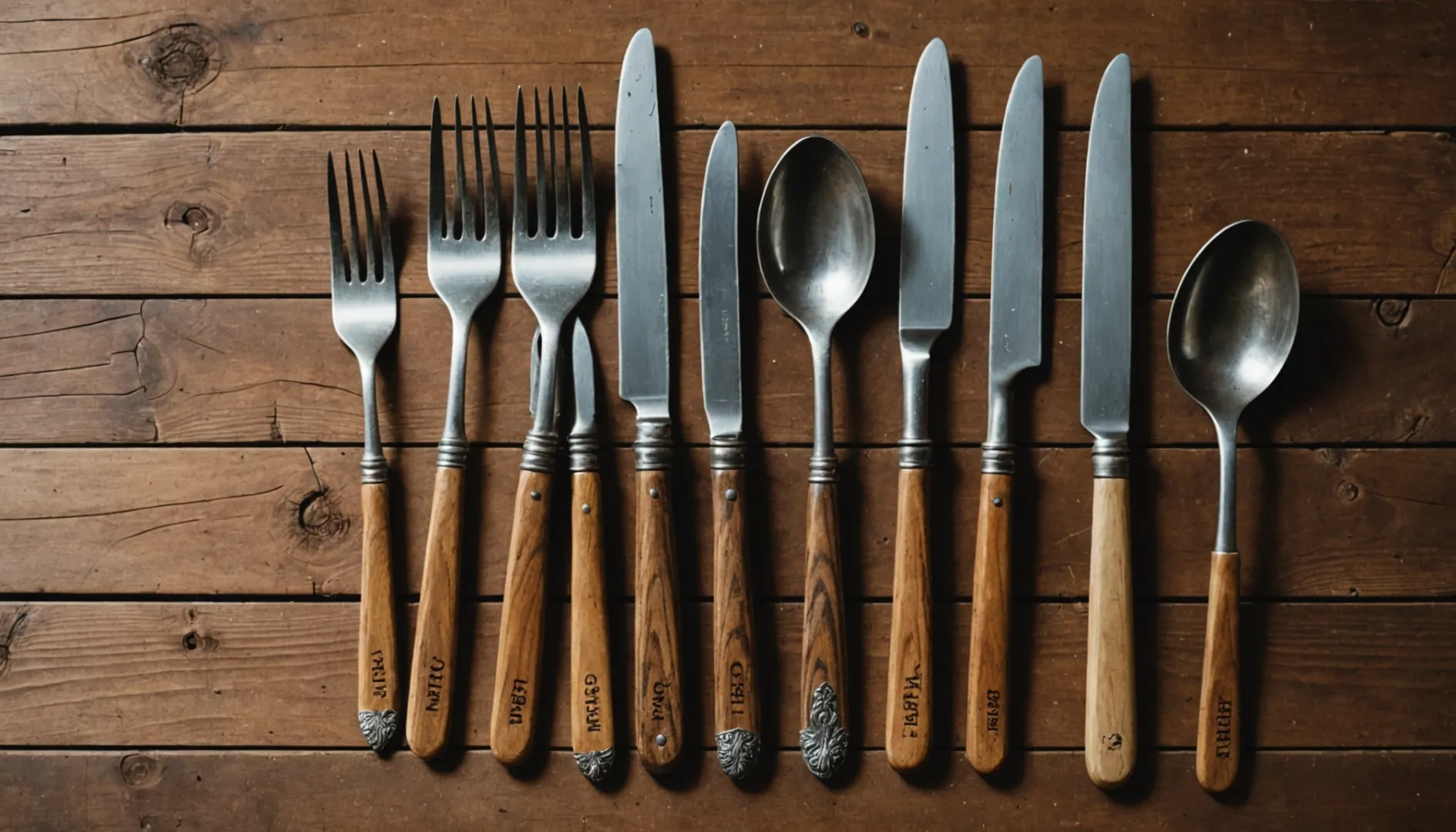
Understanding Key Certifications
Eco-friendly cutlery, particularly made from wood, must adhere to various certifications5 that ensure both environmental responsibility and consumer safety.
FSC Certification
The Forest Stewardship Council (FSC) certification is paramount for verifying that the wood used in cutlery comes from responsibly managed forests. This certification assures consumers that products contribute to forest conservation and biodiversity, aligning with sustainable sourcing practices.
FDA and LFGB Certifications
For food safety, the FDA (Food and Drug Administration) certification is crucial, particularly in the U.S. market. It ensures that materials are safe for contact with food, free from harmful chemicals, and meet hygiene standards. In Europe, the LFGB (Lebensmittel- und Futtermittelgesetzbuch) certification plays a similar role, ensuring products comply with stringent German food safety laws.
Life Cycle Analysis (LCA)
A comprehensive Life Cycle Analysis6 provides measurable data on a product's environmental impact throughout its lifespan, from production to disposal. This data helps manufacturers improve sustainability practices and allows consumers to make informed decisions based on a product's ecological footprint.
Importance of Transparency
Transparency in the supply chain is increasingly demanded by consumers who are concerned about the origins of the materials. Technologies such as blockchain are being employed to ensure traceability, enhancing trust and demonstrating a commitment to ethical sourcing.
| Certification | Purpose | Region |
|---|---|---|
| FSC | Sustainable sourcing | Global |
| FDA | Food safety | USA |
| LFGB | Food safety | Europe |
| LCA | Environmental impact | Global |
By prioritizing these certifications, manufacturers not only comply with regulations but also gain a competitive edge in markets where eco-consciousness is paramount. Understanding these certifications is vital for anyone involved in the production or consumption of eco-friendly cutlery.
FSC certification ensures sustainable wood sourcing.True
FSC verifies wood is from responsibly managed forests, aiding sustainability.
LFGB certification is required in the U.S. for cutlery safety.False
LFGB is a European standard; FDA governs U.S. food safety.
What Trends Are Shaping the Future of Wooden Cutlery Manufacturing?
As global interest in sustainable living grows, wooden cutlery manufacturing is evolving rapidly. Innovations and consumer demands are driving new trends that promise to reshape the industry.
The future of wooden cutlery manufacturing is being shaped by trends such as eco-certification, supply chain transparency, innovative designs for waste reduction, and the use of technology for better traceability and sustainability.
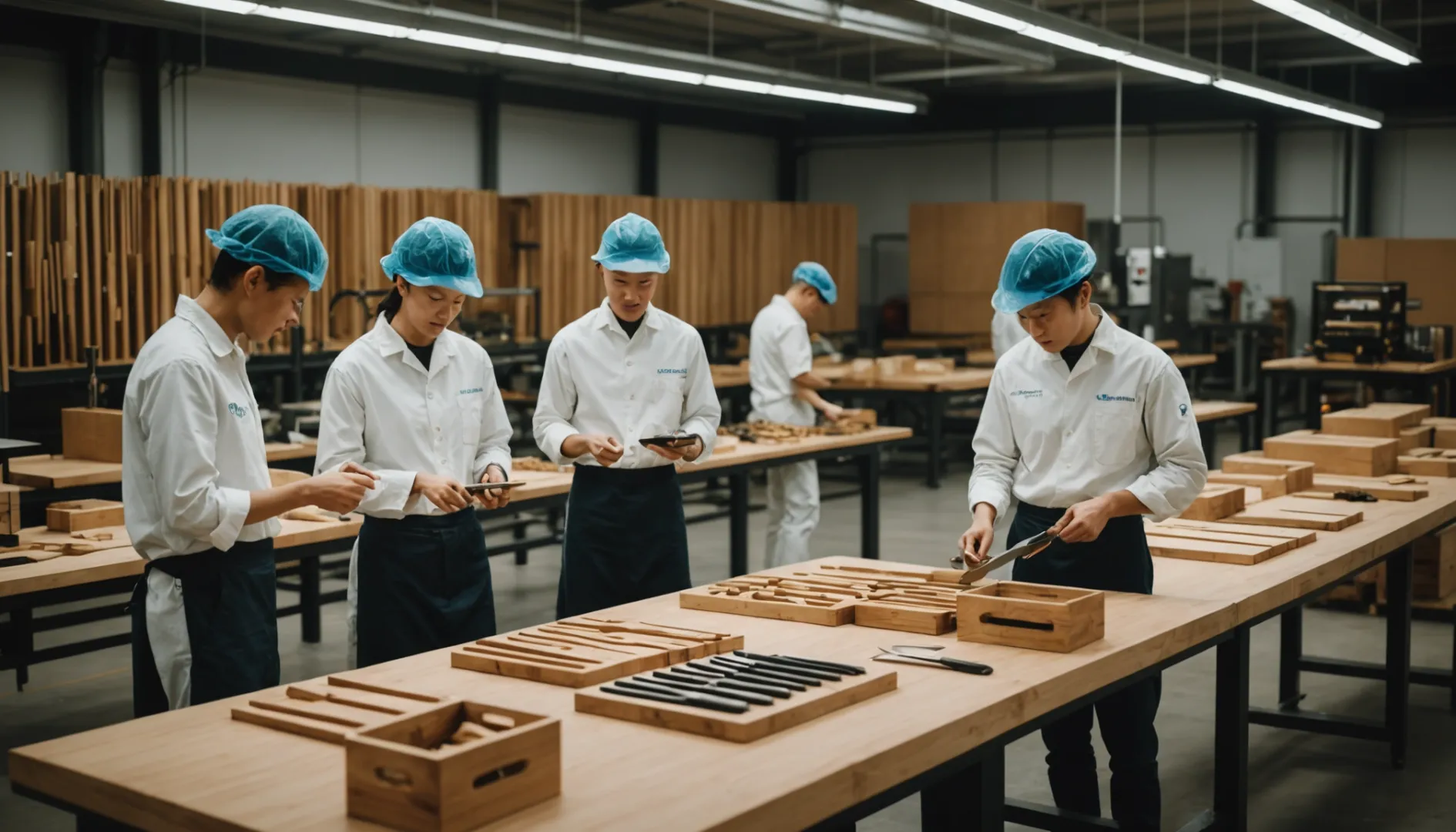
Eco-Certification and Environmental Standards
One of the most significant trends in wooden cutlery manufacturing is the emphasis on eco-certifications. Certifications like FSC (Forest Stewardship Council) and FDA compliance are becoming essential for companies aiming to establish credibility in environmentally conscious markets. These certifications not only ensure that the wood is sourced sustainably but also verify that the manufacturing process adheres to rigorous environmental standards. As regulations on single-use plastics tighten, particularly in regions like North America and Europe, having such certifications can offer a competitive edge.
Supply Chain Transparency
Consumers today are more interested than ever in the origins of their products, leading to an increasing demand for transparency in the supply chain. Technologies such as blockchain are being explored to verify wood sources, ensuring that materials are harvested sustainably and legally. This traceability fosters trust between brands and consumers, positioning companies as ethical leaders. Brands utilizing blockchain can provide verifiable data from forests to factories, enhancing their appeal in markets with high regulatory standards.
Innovative Designs for Waste Reduction
Innovation in design is another trend shaping the future of wooden cutlery manufacturing. Companies are adopting minimalist designs that use less wood without compromising durability, thereby reducing material costs and environmental impact. Some manufacturers are experimenting with compostable coatings to enhance biodegradability, while others are exploring combinations with materials like bamboo fiber to create stronger yet lightweight utensils. This innovation is crucial as regulations around single-use items become more stringent.
Technology for Better Sustainability
The integration of technology is playing a pivotal role in improving the sustainability of wooden cutlery. Life Cycle Analysis (LCA) is becoming a standard practice among manufacturers, providing measurable data on energy and resource usage throughout the product lifecycle. This data not only enhances credibility but also helps companies identify areas for improvement in their sustainability practices.
Consumer Education and Awareness
Educating consumers on proper care and maintenance is vital for extending the life of wooden cutlery. As part of this trend, manufacturers are focusing on raising awareness about how to treat wooden utensils to prevent microbial contamination and extend usability. By highlighting practices like regular oiling and avoiding moisture exposure, companies are ensuring that consumers can maintain both the appearance and functionality of their utensils over time. This educational push aligns with the broader consumer interest in sustainable living practices.
These trends illustrate a dynamic shift in the wooden cutlery industry, where innovation, sustainability, and consumer awareness are at the forefront. As manufacturers adapt to these changes, they not only contribute to environmental conservation but also meet the growing demand for eco-friendly products.
To explore these trends further, discover how eco-certification impacts market positioning7 or learn about blockchain's role in supply chain transparency8.
Eco-certifications enhance market positioning.True
Eco-certifications like FSC improve credibility in eco-conscious markets.
Blockchain decreases supply chain transparency.False
Blockchain increases transparency by providing verifiable data on wood sources.
Conclusion
The top disposable wooden cutlery manufacturers in India excel in quality and sustainability, offering eco-friendly options that align with global standards. Choose wisely to enhance your brand’s commitment to the environment and appeal to eco-conscious consumers.
-
Learn how compostable coatings enhance biodegradability of wooden utensils.: These wooden spoons are not only home-compostable but also commercially compostable to compost within 180 days in a commercial composting facility. ↩
-
Explore how short-term reuse reduces waste and extends product life.: Reuse cutlery for pet food. Plastic wrapping goes to local grocery store that has plastic film/plastic bag recycling bin. ↩
-
Discover how FSC certification supports sustainable forestry practices globally.: Environmental Protection - FSC's forest management standards expand protection of water quality, prohibit harvest of rare old-growth forest, ... ↩
-
Learn about emerging coatings enhancing biodegradability and hygiene in wooden cutlery.: This can be rectified by giving your wooden cutlery a plastic coating. Of course, the coating then makes composting virtually impossible as the ... ↩
-
Learn about essential certifications ensuring eco-friendly cutlery's sustainability and safety.: Discover essential eco-certifications like FDA, LFGB, and FSC for ensuring the safety and sustainability of wooden cutlery. ↩
-
Discover how LCA improves sustainability practices in cutlery manufacturing.: The aim of this paper is to analyse substitutes to disposable plastic tableware using the Life Cycle Assessment methodology. The alternatives are objects made ... ↩
-
Understand how certifications enhance credibility in eco-conscious markets.: Producer entry into the eco-label market (producer entry) will likely affect competition in multiple arenas: competition on environmental quality (producer ... ↩
-
Learn how blockchain fosters trust through verifiable data.: Blockchain can greatly improve supply chains by enabling faster and more cost-efficient delivery of products, enhancing products' traceability, improving ... ↩

